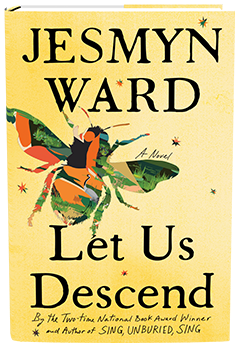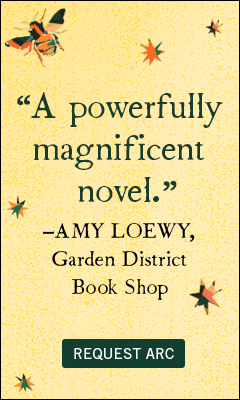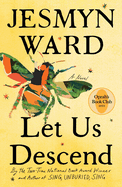Let Us Descend
by Jesmyn Ward
Two-time National Book Award-winner for Fiction Jesmyn Ward (Men We Reaped; Navigate Your Stars; The Fire This Time; Sing, Unburied, Sing; Salvage the Bones) takes a different direction with her fourth novel, Let Us Descend: it's her first historical narrative. Beautifully written and heartrending, Ward's story sensitively handles grief, love, and recovery. On a rice plantation in the Carolinas, an enslaved teenager named Annis narrates as she works alongside her beloved mother. Mama is a source of comfort and strength even as her finger bones are "blades in sheaths." Annis says, "The first weapon I ever held was my mother's hand." This steely woman teaches Annis lessons of combat learned from her own mother, one of thousands of warrior wives to an African king, tasked with both protection and elephant hunting. "In this world, you your own weapon," she tells her daughter, and Annis will need to be.
Annis's father is the plantation owner who owns her and her mother. Annis has half-sisters in the big house. "My sire's house hulks; its insides pinned by creaks," and her "sallow sisters" have a tutor to read to them, to teach them the texts of ancient Greece, about bees and wasps and Dante's Inferno: "The tutor is telling a story of a man, an ancient Italian, who is walking down into hell. The hell he travels has levels like my father's house." Let Us Descend's title is a nod to Dante, and a cue to the reader to notice hells, descents, and journeys south. Annis listens and learns. Through her natural gifts, her own interest, and with her mother's help, she becomes skilled in foraging: herbs, mushrooms, medicinal plants, and simple foods. She learns to befriend the bees she hears her sisters' tutor speak of.
Then Annis's father chooses to sell her mother south. The "Georgia Man" takes her away in a line of stolen people for the long walk to market. Annis falls into a near-fatal grief at being left without the most important person in her life, until a kind friend pulls her back to the surface. But soon, Annis and Safi, her friend-turned-lover, are sent on the same walk with the Georgia Man. From the plantation where she was born, Annis makes a death march to a New Orleans slave market and is sold to a cruel lady whose Louisiana sugar plantation marks a further descent, into a new level of hell. Others will uplift her along the way, but she never shakes the excruciating grief for her mother.
Along the way she gains and loses friends, and meets a spirit: Aza controls the storms and winds, and has stolen the name of Annis's maternal grandmother, the warrior Mama Aza. "Aza's hair a living thing: scudded clouds, the setting sun lighting them on fire. She leans forward and a breeze blows from her. Feels like the slap of a freshly washed linen on my face, snapping in a cool wind." The spirit seeks her own identity and self-importance in relation to others, and has locked onto Annis's maternal line as a way to achieve this: she models herself after the grandmother Annis never knew, and her use of the name Aza represents both connection and theft. That Annis refers to enslaved people like herself as "stolen" adds a layer to Aza's use of the name.
Less centered around plot and character than Ward's previous novels, Annis's story is more elemental and thematic, dealing primarily with grief, forces of nature and human evil, villains and allies. The spirits she meets--chiefly Aza, but others as well--are closely associated with natural forces. "Another spirit, white and cold as snow, walks the edge of the river; it hungers for warmth, for breath, for blood, for fear, and it, too, glances against the enslaved stolen and feeds. Another spirit slithers from rooftop to rooftop before twining about wrought iron balconies outside plaçage women's bedrooms, where it hums, telling the bound women to portion out poison in pinches over the years, to revolt, revolt, revolt." These spirits can help but also harm, offer but also take away; they may represent another form of attempted ownership, as Aza has taken Mama Aza's name. In a magical-realism twist, Annis finds these spirits widen her world beyond her immediate suffering to other timelines and possibilities.
Just as Ward's title refers to Dante's story of a descent into ever-deeper levels of hell, her hero makes a parallel, nonconsensual descent into the deeper South, into pain and suffering and sorrow, and into the worsening and worst of humanity. The novel moves with Annis from the Carolinas to Louisiana, and in story, back to Africa, where Mama Aza established the fighting spirit she would pass on.
Ward gives Annis's voice a raw strength and musicality. After she is imprisoned in an underground cell by a particularly sadistic plantation owner, Aza tells her, "When you were up north, your sorrow choked your song. Swallowed it down. Even so, it hummed. But the walk changed it. The further you went, the more it rose until the woman put you down in the earth. Then it shrieked." Attention to descriptive detail emphasizes Annis's close relationship to place, and the importance of the land itself (not least in supplementing the enslaved people's painfully meager allotted diet). "The water reaches in every direction, duckweed bright and green, floating on the murky wet. Cypress, fresh with rain, shimmers."
As much pain, struggle, torture as there is in these pages, there are also various forms of love, and great strength, power, and personal reclamation. Let Us Descend ends with surprising hope. "How the whitewash of starlight would buoy them along. How they dance with the rocking deck. How them sing." With this novel, Ward's talent continues to deepen and glow. --Julia Kastner








